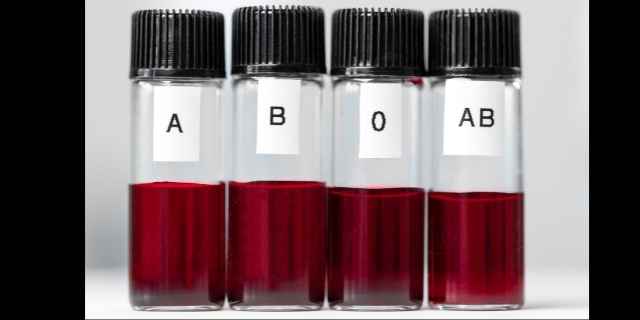23andMe used to show customers their blood type. This dates back to a few years from 2009. The company discontinued providing blood type information as part of DNA results.
You may be tempted to use your 23andMe DNA results with independent services that try to derive your blood type from the data. This article gives pros and cons, and some advice on how to get genuine blood type results for free.
The Original 23andMe Blood Type Reports
You may see blogs and forums that mention the 23andMe ABO Blood Type report.
Even the 23andMe website hasn’t removed some of the old pages that reference it. This is a link that dates back to 2010.
Back in the early days of the company, your DNA results included an ABO blood type report within the health section. It looked like this:

23andMe has discontinued its blood type report. Disregard old web content that mentions this report.
The 23andMe ABO Blood Type Report Wasn’t Always Reliable
Notice how the word “probable” was part of the titles in the report?
There’s an old complaint on the 23andMe forum from a new user saying they must have been given someone else’s DNA results.
The reason the guy was so sure about this was that he already knew his blood type from medical testing. But 23andMe was showing completely different information.
In fact, there was no mix-up between DNA kits here. It’s just that the 23andme blood typing wasn’t always reliable. And 23andMe was honest about this.
The company provided a health warning (pun intended) with their blood type results.
Rare mutations
Part of their disclaimer sounded like unreliability was a rare issue.
There are many other mutations and deletions in the ABO gene that can affect blood type. If you have one of these more rare mutations, your actual blood type could be different than that predicted….
23andMe disclaimer, quoted from Karen’s Cubby
But another section of the disclaimer points to a wider problem.
Problems from phasing
You probably know that our chromosomes are in pairs. We inherit one copy within a pair from our mother and the other from our father.
The current state of consumer DNA analysis cannot determine which genetic information comes from which copy. So, 23andMe uses a technique they call “phasing” to estimate which parent the information came from.
This is what they said about the impact on their blood type reports.
However, this method may introduce errors into your predicted blood type.
23andMe disclaimer, quoted from Karen’s Cubby
Can You Use 23andMe Results To Get Your Blood Type?

Several commercial companies will attempt to analyze your blood type if you upload your 23andME DNA results to their websites.
Promethease is a reputable site that will also give you a wide range of health reports. It costs about 12 bucks. (You can check out our article on who owns Promethease).
Be warned if all you want is your blood type. You may want to avert your eyes from all the other possibly scary health stuff that this site attempts to analyze.
However, before you try to use your 23andMe results to get your blood type, bear in mind that this will not be as reliable as a standard medical blood analysis.
The problems that 23andMe had in their disclaimer (covered in the prior section) haven’t gone away. The DNA tests aren’t designed to test for blood types.
The independent analysis looks for specific markers (SNPs) in your DNA results that partly predict blood type. But your DNA test doesn’t have all the markers that would need to provide an accurate assessment in all cases.
Here are some quotes from the 23andMe forums from people who used these services. To be fair, plenty of people report that their blood typing is correct. But not everybody:
I checked out my blood type on Codegen.eu… and they were wrong. Prometheus couldn’t figure it out at all.
Promethease was half right with mine, they suggested I’d be either A or B and I’m B+.
Personally, I wouldn’t bother trying to use my 23andMe DNA results as a workaround like this. I’d get a proper test conducted.
If you’re on a limited budget, then the most reliable way will probably be through donating your blood. I’ll cover this in the next section.
Free Ways To Find Your Blood Type

Here are some alternative ways to find your blood type for free.
Donate blood
When you donate blood to reputable health organizations, the companies need to analyze your blood type. Aside from that, they’ll probably run a series of checks for diseases.
You will usually be given your blood type – just remember to ask for it!
Ask your parents about hospital baby records
Depending on where and when you were born, the hospital may have given your proud new parents a medical chart that included your blood type.
See if you can jog their memories. The document may be stored in the drawer with your first lock of hair and a milk tooth.
Dig through your old school documents
Do you have vague childhood memories of your entire class being blood tested? Local health authorities may do annual health checks for a specific age group.
This is another case of asking your parents. They may have been given a copy of the medical results.
Sell your blood plasma
Strictly speaking, this isn’t a free method. But in this case, it’s you who are getting paid!
Make sure that you are using a licensed and certified plasma center. And be sure to ask for your blood type as you are counting your hard-earned dollars.
More About 23andMe?
We have lots of articles and tutorials on 23andMe that focus on family history research.
Check out our Ultimate Guide to using 23andMe for genealogy. It has all the links to specific articles that cover everything you need to know.